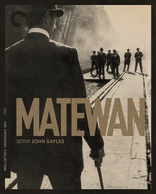Matewan Blu-ray Movie
HomeMatewan Blu-ray Movie 
Criterion | 1987 | 133 min | Rated PG-13 | Oct 29, 2019Movie rating
7.9 | / 10 |
Blu-ray rating
| Users | 4.5 | |
| Reviewer | 4.0 | |
| Overall | 4.0 |
Overview
Matewan (1987)
A labor union organizer comes to an embattled mining community brutally and violently dominated and harassed by the mining company.
Starring: Chris Cooper, Mary McDonnell, Will Oldham, David Strathairn, Ken Jenkins (I)Director: John Sayles
| Drama | 100% |
| History | 7% |
Specifications
Video
Video codec: MPEG-4 AVC
Video resolution: 1080p
Aspect ratio: 1.85:1
Original aspect ratio: 1.85:1
Audio
English: LPCM Mono (48kHz, 24-bit)
Subtitles
English SDH
Discs
Blu-ray Disc
Single disc (1 BD)
Playback
Region A (locked)
Review
Rating summary
| Movie | 4.0 | |
| Video | 4.0 | |
| Audio | 4.0 | |
| Extras | 3.5 | |
| Overall | 4.0 |
Matewan Blu-ray Movie Review
Labor pains.
Reviewed by Jeffrey Kauffman January 28, 2020Are we entering an era when, as some have suggested, unions have run their course? Do workers need to “officially” organize when social media, hashtags and other accoutrements of the internet age can achieve at least one goal of unions, namely to make the public at large aware of “issues” at a place of employment? Things were obviously much different in the early 1920s, when John Sayles’ often riveting ode to union organizing Matewan takes place. The film is culled from a real life union uprising that resulted in tragedy in a small mining town in West Virginia, where nascent union organizers butted heads (and, ultimately, exchanged gunfire) with representatives of the mine who frequently resorted to some fairly nefarious tactics in order to keep the workers “in line”. Matewan is an often dour and even depressing film, but it has a rare authenticity that keeps the emotional content consistently churning, even though the film’s kind of inexorable march toward a bittersweet ending may leave some viewers feeling at least partially spent rather than completely cathartic.
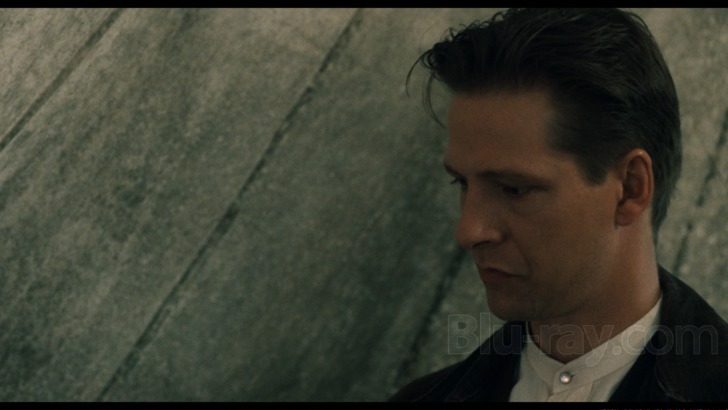
Things are already at least simmering if not quite yet boiling as Matewan opens and begins to document the unrest miners work for Stone Mountain Coal Company in West Virginia are feeling. The company higher ups are having none of the workers’ complaints, and in fact are threatening to take decisive action, including cutting already pretty meager pay, if any of the workers follows through on their own threats to unionize. The company has also come up with a brilliant if unsettling strategy to keep the existing workers in line: they have decided to “import” workers from other areas to immediately replace any workers who decide to join a union (interestingly, not necessarily moving to the “next step” and striking, but simply joining). The fact that the Stone Mountain Coal Company brings in a number of “non white” ethnicities, notably a group of African Americans including the weirdly named Few Clothes Johnson (James Earl Jones) indicates that the management types are only too aware of already existing racial tensions which are obviously going to play into the overall uneasiness of the situation.
Union organizer Joe Kenehan (Chris Cooper in his first feature film starring role) is actually on the same train headed toward Matewan as some of the “newly recruited” black miners and is given a first hand view into the fractious environment that is developing in and around Matewan when the train is stopped and white miners threaten to attack the so-called "scabs" being trained in to replace them. Kenehan is earnest, but he’s not especially skilled in his job (some of the supplements get into the fact that writer-director John Sayles wanted Cooper to play the part as at least slightly unsure), but he rather quickly ingratiates himself into Matewan’s hardscrabble society, taking up residence at the boarding house of Elma Radnor (Mary McDonnell), the widow of a deceased miner, where he also befriends Elma’s teenaged son Danny (Will Oldham) who is already gainfully (?) employed in the mine, as per the standards of the time and place.
Matewan offers a rather dense, novelistic approach toward a number of aspects woven into the plot, including the overall socioeconomic blight afflicting this region, but it perhaps arguably tips over into screed territory at times, especially with regard to some of the patently villainous behaviors on the part of the mine company’s “enforcers”. That said, at least some of the activities displayed seem to be based largely in fact, but the film might have toned down some of its more hyperbolic aspects, including an interesting but kind of tangential scene wherein Kenehan’s life is temporarily threatened by one of the supposed “good guys”.
Matewan does manage to evoke its era almost frighteningly well at times, with characters regularly swathed in coal dust and other detritus from the West Virginia countryside, and with characters who speak and move like “natives”. There’s an appealingly naturalistic flow to the film despite any perceived “oratory” on the part of abused workers, and as Sayles mentions in one of the supplements included on this disc, the whole Matewan labor uprising is rather interesting in and of itself since it ends up climaxing in what is almost a Wild West (or in this case, wild southeast ) showdown at “high noon”.
Matewan Blu-ray Movie, Video Quality 

Matewan is presented on Blu-ray courtesy of The Criterion Collection with an AVC encoded 1080p transfer in 1.85:1. The accordion style foldout included as an insert has the following information on the transfer:
Matewan is presented in its original aspect ratio of 1.85:1. Black bars ar the top and bottom of the screen are normal for this format. This new digital transfer was created in 4K resolution on a Lasergraphics Director film scanner from the 35 mm original camera negative, preserved by Anarchists' Convention Inc. and the UCLA Film & Television Archive. An archival 35 mm print manufactured by the UCLA Film & Television Archive under the supervision of cinematographer Haskell Wexler was used as a color reference. Thousands of instances of dirt, debris, scratches, splices and warps were manually removed using MTI Film's DRS, whicle Digital Vision's Phoenix was used for jitter, flicer, small dirt, grain, and noise management.Since my hunch is this transfer may be somewhat controversial for some fans (as already evidenced by our Forum), it might also be salient to point out that the credits for this Blu-ray release state that the "transfer supervisor" was John Sayles (as many will know, the venerated Haskell Wexler passed away in 2015). I can't imagine anyone really complaining about detail levels and the generally very organic looking presentation here, and those parts of this presentation will most likely please even the most demanding videophiles. The color timing of this is going to strike some as "different", but that of course raises the question, compared to what? Sayles and Wexler actually get into some of the exigencies of the filming in their commentary, which was evidently done a couple of years before Wexler's passing, and those who have major issues with the look of this transfer may want to give those comments a listen for contextual reasons at least, but there's no denying that things are quite often rather yellow and green looking, as evidenced by a number of screenshots I've uploaded to this review. This frankly did strike me as looking a bit unnatural in terms of some of the almost weirdly yellow-orange flesh tones, but what I also noticed is the grading towards these tones wasn't bathed on the film uniformly, and in fact seemed to be more of a stylistic choice. For example, greens and yellows are often pushed in some scenes in the church or even the interior of Elma's house when they aren't at all in other scenes which take place both inside and outside. One way or the other, I've attempted to provide a "spectrum" (pun intended) of screenshots here so that those interested can see the variety of tones that are emphasized at various moments throughout the film. All of that said, there are some slight variances in densities, saturation and grain structure which flit by now and again, some of which can affect overall clarity and detail levels, as evidenced by screenshots 18 and 19.
The original monaural soundtrack was restored by the UCLA Film & Television Archive from the 35 mm full-coat six-track magnetic master at Audio Mechanics in Burbank, California, under the supervision of Ross Lipman.
Matewan Blu-ray Movie, Audio Quality 
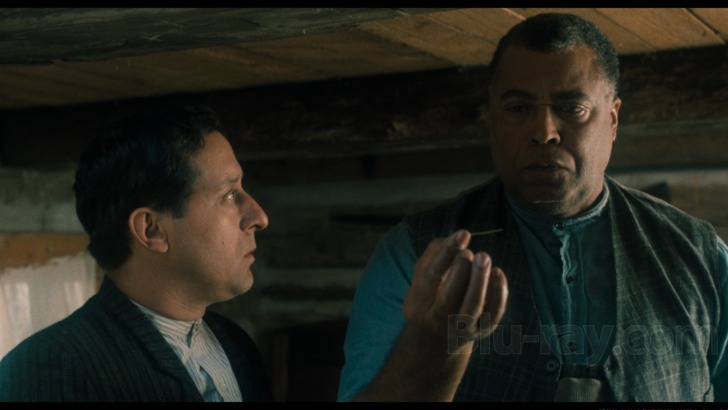
Matewan's nicely evocative soundtrack is presented via LPCM Mono. The film has some nice rootsy and "jangly" music courtesy of Mason Daring, which may remind some at least in passing of certain elements in films like O Brother, Where Art Thou?, and while the mono rendering obviously doesn't offer much separation or width, the track is full bodied with excellent fidelity. Dialogue and the bookending narration sound fine throughout as well, with no problems whatsoever that I noticed.
Matewan Blu-ray Movie, Special Features and Extras 
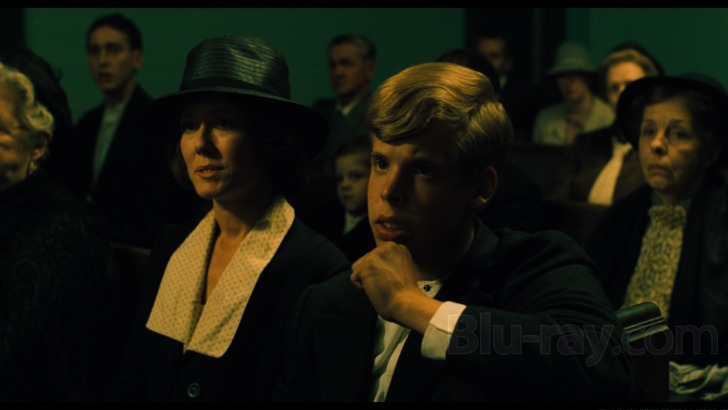
- The Making of Matewan features two separate but interwoven featurettes which offer a number of interviews with
members of the cast and crew:
- Union Dues (1080p; 26:17) offers some great background courtesy of interviews with John Sayles and Maggie Renzi among others.
- Sacred Words (1080p; 31:28) serves up more of the same, and brings back many of the same interview subjects, which also include Chris Cooper and Mary McDonnell.
- The Music of Matewan (1080p; 18:46) offers a 2019 interview with composer Mason Daring.
- Production Design (1080p; 14:43) is a 2019 interview with production designer Nora Chavoosian (who also is featured in the "making of" featurettes, above), here discussing some of the challenges of recreating a very specific time and place on a pretty limited budget.
- Them That Work (1080i; 27:57) is a really fascinating short film by Jason Brown, a professor at Valdosta State University, who was encouraged by producer Maggie Renzi to document what Matewan has meant to West Virginians.
- Audio Commentary features John Sayles and cinematographer Haskell Wexler (who received a well deserved Academy Award nomination for his work on this film).
- Trailer (1080p; 1:46)
Matewan Blu-ray Movie, Overall Score and Recommendation 
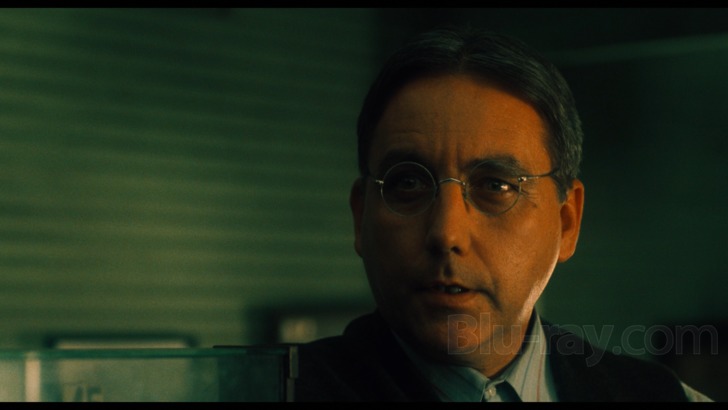
Matewan is often a pretty chilling indictment of the lengths some people went to keep other people from unionizing, but it arguably tips over a bit into melodrama, which may actually undercut some of its emotional depth. Still, the film is a cornucopia of nicely nuanced performances, and Sayles and his team worked wonders on what was evidently a miniscule budget in terms of production design. Haskell Wexler's cinematography is suitably hazy and almost dreamlike at times, though as indicated above my hunch is this release, somewhat like Criterion's version of The Tree of Wooden Clogs, is going to raise some fan hackles due to the color timing. With that potential caveat for some in mind, Matewan comes Recommended.
Similar titles
Similar titles you might also like

Magnificent Doll
1946

Frontera
2014

The Wild One
1953

Age of Uprising: The Legend of Michael Kohlhaas
2013

Intolerance
Intolerance / The Mother and the Law / The Fall of Babylon
1916

Return to Paradise
1998

The War Within
2005

Old Joy
2006

Heart of Glass
Herz aus Glas
1976

I, Daniel Blake
2016

Minari
2020

Calendar
1993

A Raisin in the Sun
1961

Wake in Fright
1971

Henry V
1944

Selma
2014

Silence
2016

Nicholas and Alexandra
Limited Edition to 3000 - SOLD OUT
1971

Who's Afraid of Virginia Woolf?
Warner Archive Collection
1966

Five Easy Pieces
1970
